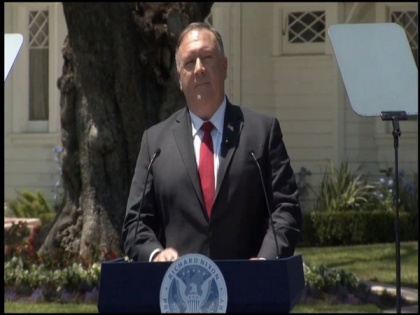US tightens noose around Huawei, 38 of its affiliates added to Entity List
By ANI | Published: August 18, 2020 03:05 AM2020-08-18T03:05:10+5:302020-08-18T03:20:02+5:30
The US has expanded its Foreign Direct Product Rule in an attempt to prevent Huawei, a Chinese tech company, from finding a way around American law through alternative chip production and provision of off-the-shelf (OTS) chips produced with tools acquired from the United States.

US tightens noose around Huawei, 38 of its affiliates added to Entity List
The US has expanded its Foreign Direct Product Rule in an attempt to prevent Huawei, a Chinese tech company, from finding a way around American law through alternative chip production and provision of off-the-shelf (OTS) chips produced with tools acquired from the United States.
According to a statement released by the US Department of State, 38 Huawei affiliates have been added to its Entity List, which identifies foreign parties prohibited from receiving certain sensitive technologies.
"The Department of State strongly supports the Commerce Department's expansion today of its Foreign Direct Product Rule, which will prevent Huawei from circumventing U.S. law through alternative chip production and provision of off-the-shelf (OTS) chips produced with tools acquired from the United States. This measure follows the more limited expansion of the Foreign Direct Product Rule in May, which Huawei has continuously tried to evade," Michael Pompeo, US Secretary of State said on Monday.
The Commerce Department has also allowed Huawei's Temporary General License (TGL) to expire.
"The United States has provided ample time for affected compes and persons - primarily Huawei customers - to identify and shift to other sources of equipment, software, and technology and wind-down their operations. Now that time is up," Pompeo added.
Earlier, President Donald Trump indicated that he was looking to ban other Chinese-owned compes, including e-commerce giant Alibaba in the United States, days after signing an executive order targetting TikTok's parent company, ByteDance, Fox News reported.
The development came after Trump issued an executive order on August 14, requiring ByteDance to divest its interests in video-sharing app TikTok's operations in the US within 90 days.
"There is credible evidence that leads me to believe that ByteDance ... might take action that threatens to impair the national security of the United States," the US President said in the order.
The new order came after an earlier executive order was signed by Trump. The previous order could have forced US-based app stores to stop distributing the TikTok app if ByteDance did not reach a deal to divest from it in 45 days.
Under the latest order, ByteDance is expected to destroy all its copies of TikTok data attached to American users.
Earlier this month, US Secretary of State Michael Pompeo said that the Trump administration is "working hard" to protect Americans from the threats of "untrusted vendors" such as TikTok and WeChat, which it wants to remove from US app stores like those operated by Apple and Google.
US politicians have repeatedly criticised TikTok, owned by Beijing-based startup ByteDance, of being a threat to national security because of its ties to the Chinese Communist Party.China and the US are at loggerheads on a variety of issues including Hong Kong national security law, the South China Sea, coronavirus and trade.
Last month, India's Ministry of Electronics and Information Technology (MEITY) banned 47 apps, which were variants and cloned copies of the 59 apps banned earlier in June.
These banned clones include Tiktok Lite, Helo Lite, SHAREit Lite, BIGO LIVE Lite and VFY Lite.The 59 apps, most of which were Chinese, had been banned by the Indian government in view of the information available that they are engaged in activities which are "prejudicial to sovereignty and integrity and defence" of the country.
The ban came amid the standoff between Indian and Chinese troops in Eastern Ladakh.
( With inputs from ANI )
Open in app